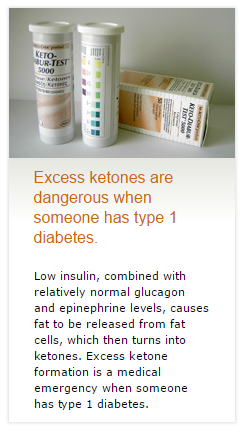The reason I placed these notes in my blog instead of just placing a link is that by copying them they can function as study notes [the whole blog is essentially just my study notes] and doing this helps me remember the topic.
All that follows is from Ketones by Diabetes Education Online:
In a person without diabetes, ketone production is the body’s normal adaptation to starvation. Blood sugar levels never get too high or too low, because the production is regulated by just the right balance of insulin, glucagon and other hormones. However, in an individual with diabetes, dangerous and life-threatening levels of ketones can develop.
What are ketones and why do I need to know about them?
Ketones and ketoacids are alternative fuels for the body that are made when glucose is in short supply. They are made in the liver from the breakdown of fats.
Ketones are formed when there is not enough sugar or glucose to supply the body’s fuel needs. This occurs overnight, and during dieting or fasting. During these periods, insulin levels are low, but glucagon and epinephrine levels are relatively normal. This combination of low insulin, and relatively normal glucagon and epinephrine levels causes fat to be released from the fat cells.
The fats travel through the blood circulation to reach the liver where they are processed into ketone units. The ketone units then circulate back into the blood stream and are picked up by the muscle and other tissues to fuel your body’s metabolism.
However, the situation is VERY different in type 1 diabetes, where the presence of EXCESS ketones can be dangerous and life-threatening. In type 1 diabetes, when there is not enough insulin, the fat cells keep releasing fat into the circulation, and the liver keeps making more and more ketones and ketoacids. The problem is too many ketones! The rising ketoacid levels make the blood pH too low (acidotic/diabetic ketoacidosis), which is an emergency medical situation and requires immediate care.
diabetic ketoacidosis can occur when you have type 1 diabetes [even if you are on insulin replacement therapy with injections or an insulin pump] and is a medical emergency.





